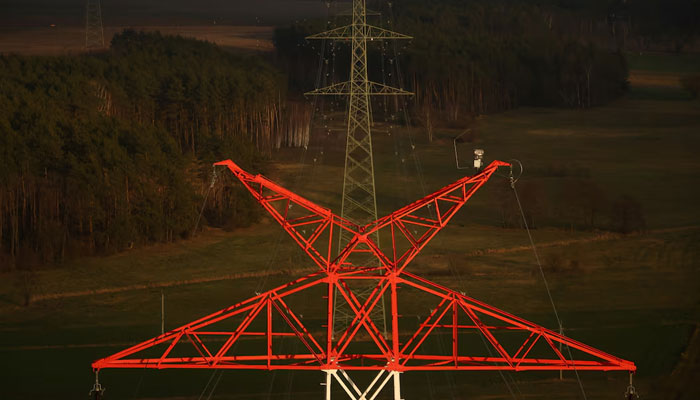Baltics disconnect from Russian power grid
VILNIUS: The three Baltic states on Saturday seamlessly cut ties with Russia’s power grid to integrate with the European Union’s network, a switch that gained urgency with Moscow’s invasion of Ukraine.
Estonia, Latvia and Lithuania -- small EU and NATO members once part of the Soviet Union -- had planned the change for years but sped up the process after Russia’s full-scale Ukraine invasion.
The war launched in February 2022 triggered fear in the Baltics that they could be targeted next. The staunch Ukraine supporters also worried that Russia would blackmail them using the electricity system. “We are safe because we have disconnected from the Russian grid,” Nerijus Cesiulis, mayor of the southern Lithuanian city of Alytus, told AFP.
He added it was important to avoid a repeat of incidents “like those in the Baltic Sea”, where several undersea telecom and power cables have been severed in recent months. Some experts and politicians have accused Russia of waging a “hybrid war”, including unconventional targeting of energy supplies, an allegation Moscow denies.
Authorities had warned of the potential for sabotage or other disruptions linked to the grid switch, but the disconnection went off without a hitch. Baltic grid operators said Russia had cooperated during the disconnection process.
The European Commissioner for Energy, Dan Jorgensen, said it was “a historic day”. “I like the light better when there’s no Russian electrons involved,” he told reporters in Estonian capital Tallinn.
“This is about security... No European country should be dependent on Russia for anything,” he added.
Ukrainian Energy Minister German Galushchenko also hailed the disconnection as a “significant event for the whole of Europe”. After the Baltic states completed the disconnection process on Saturday morning, Latvia physically cut a power line to Russia.
“Now we have complete control over our power grid,” Latvian Energy Minister Kaspars Melnis told reporters while holding a piece of dismantled wire. His Lithuanian counterpart Zygimantas Vaiciunas told AFP they had eliminated any potential for Russia to use grid control “as a weapon”.
Vaiciunas said the Baltics were now operating in so-called “isolated mode” before they integrate with the European grid via Poland on Sunday.
The window of time was so they could run tests to assure Europe their energy system was stable, Lithuanian state-run grid operator Litgrid said.
It added on Saturday evening it had completed all “frequency control tests” and everything was progressing as planned.
A total of 1.6 billion euros ($1.7 billion) -- mostly EU funds -- have been invested in the synchronisation project across the Baltic states and Poland. European Commission chief Ursula von der Leyen was to attend a ceremony with Baltic leaders in Vilnius on Sunday.
Lithuanian engineer Aras Valiukas, 45, was happy about the grid switch, calling it “symbolic”. The Baltics have long prepared to integrate with the European grid but faced technological and financial issues.
They stopped purchasing Russian gas and electricity after the invasion but their power grids remained connected to Russia and Belarus, controlled from Moscow.
This left them dependent on Moscow for a stable electricity flow, which is crucial for factories and facilities requiring a reliable power supply.
-
 Melissa Jon Hart Explains Rare Reason Behind Not Revisting Old Roles
Melissa Jon Hart Explains Rare Reason Behind Not Revisting Old Roles -
 Meghan Markle Eyeing On ‘Queen’ As Ultimate Goal
Meghan Markle Eyeing On ‘Queen’ As Ultimate Goal -
 Japan Elects Takaichi As First Woman Prime Minister After Sweeping Vote
Japan Elects Takaichi As First Woman Prime Minister After Sweeping Vote -
 Kate Middleton Insists She Would Never Undermine Queen Camilla
Kate Middleton Insists She Would Never Undermine Queen Camilla -
 King Charles 'terrified' Andrew's Scandal Will End His Reign
King Charles 'terrified' Andrew's Scandal Will End His Reign -
 Winter Olympics 2026: Lindsey Vonn’s Olympic Comeback Ends In Devastating Downhill Crash
Winter Olympics 2026: Lindsey Vonn’s Olympic Comeback Ends In Devastating Downhill Crash -
 Adrien Brody Opens Up About His Football Fandom Amid '2026 Super Bowl'
Adrien Brody Opens Up About His Football Fandom Amid '2026 Super Bowl' -
 Barbra Streisand's Obsession With Cloning Revealed
Barbra Streisand's Obsession With Cloning Revealed -
 What Did Olivia Colman Tell Her Husband About Her Gender?
What Did Olivia Colman Tell Her Husband About Her Gender? -
 'We Were Deceived': Noam Chomsky's Wife Regrets Epstein Association
'We Were Deceived': Noam Chomsky's Wife Regrets Epstein Association -
 Patriots' WAGs Slam Cardi B Amid Plans For Super Bowl Party: She Is 'attention-seeker'
Patriots' WAGs Slam Cardi B Amid Plans For Super Bowl Party: She Is 'attention-seeker' -
 Martha Stewart On Surviving Rigorous Times Amid Upcoming Memoir Release
Martha Stewart On Surviving Rigorous Times Amid Upcoming Memoir Release -
 Prince Harry Seen As Crucial To Monarchy’s Future Amid Andrew, Fergie Scandal
Prince Harry Seen As Crucial To Monarchy’s Future Amid Andrew, Fergie Scandal -
 Chris Robinson Spills The Beans On His, Kate Hudson's Son's Career Ambitions
Chris Robinson Spills The Beans On His, Kate Hudson's Son's Career Ambitions -
 18-month Old On Life-saving Medication Returned To ICE Detention
18-month Old On Life-saving Medication Returned To ICE Detention -
 Major Hollywood Stars Descend On 2026 Super Bowl's Exclusive Party
Major Hollywood Stars Descend On 2026 Super Bowl's Exclusive Party




